-
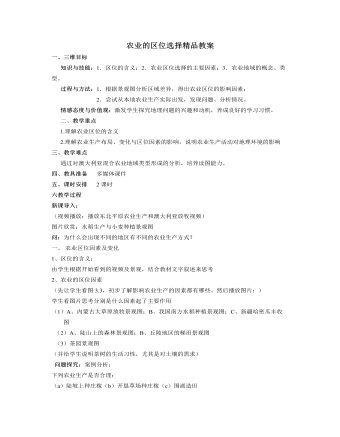
人教版高中地理必修2农业的区位选择精品教案
案例探究:环地中海地区农业的变迁让学生思考:此地哪些因素发生了变化,农业生产方式进行了如何调整?效果如何?二、农业地域的形成1、农业地域的概念:由于以上各因素的共同影响,在一定的地域和一定的历史条件下,形成了相应的生产地区,称为农业地域。农业地域的类型主要有:种植业、畜牧业、混合农业。(在这里分别给学生展示一些农业生产类型的图片,并简单说明什么是种植业、什么是畜牧业、及什么是混合农业)案例探究:阅读澳大利亚地混合农业生产思考:(1)、澳大利亚农业生产的特点是什么?(2)、澳大利亚混合农业的分布在哪里?受哪些区位因素的影响?(3)澳大利亚混合农业生产有哪些优点?
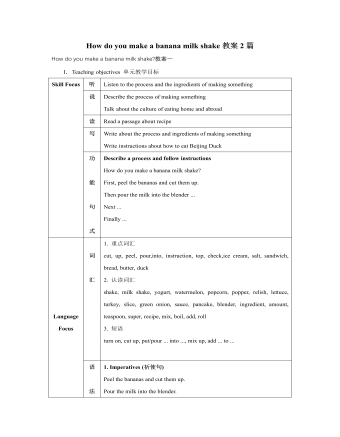
人教版新目标初中英语八年级上册How do you make a banana milk shake教案2篇
1. First, ... then, ... next, ... finally, ...首先,……然后,……接着,……最后,……这是英语中表达做某事的步骤的一种说法。如果步骤较多,还可以说:first-next-after that-later on-finally/at last通常你会听到说英语国家的人在说 first, next, then, finally 和后面的内容时,他们会做一些停顿。这样就能提前告诉听者接下来讲的是一系列的步骤。这一点在朗读和听力中应特别注意。2. how many, how much均为疑问词,同是“多少”,但用法不同。请看:how many修饰可数名词复数,how much修饰不可数名词。但在用法上,同学们常犯如下错误:1) [误] How many are there bananas on the table?[正] How many bananas are there on the table?[析] how many, how much 中的many,much是形容词,常修饰名词作定语,故后面跟名词。2) [误]How much tea are there on the table?[正]How much tea is there on the table?[析] how much修饰不可数名词时,谓语动词用单数。how many与how much的区别可简记为:前how many:问“多少”,复数名词后面跑;how much问“多少”,不可数名词单数好。前者答语用基数词,后者答语用数量关系。
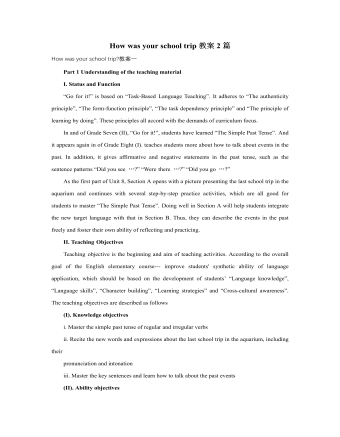
人教版新目标初中英语八年级上册How was your school trip教案2篇
“Go for it!” is based on “Task-Based Language Teaching”. It adheres to “The authenticity principle”, “The form-function principle”, “The task dependency principle” and “The principle of learning by doing”. These principles all accord with the demands of curriculum focus.In and of Grade Seven (II), “Go for it!”, students have learned “The Simple Past Tense”. And it appears again in of Grade Eight (I). teaches students more about how to talk about events in the past. In addition, it gives affirmative and negative statements in the past tense, such as the sentence patterns “Did you see …?” “Were there …?” “Did you go …?” As the first part of Unit 8, Section A opens with a picture presenting the last school trip in the aquarium and continues with several step-by-step practice activities, which are all good for students to master “The Simple Past Tense”. Doing well in Section A will help students integrate the new target language with that in Section B. Thus, they can describe the events in the past freely and foster their own ability of reflecting and practicing. II. Teaching ObjectivesTeaching objective is the beginning and aim of teaching activities. According to the overall goal of the English elementary course--- improve students' synthetic ability of language application, which should be based on the development of students’ “Language knowledge”, “Language skills”, “Character building”, “Learning strategies” and “Cross-cultural awareness”. The teaching objectives are described as follows(I). Knowledge objectivesi. Master the simple past tense of regular and irregular verbsii. Recite the new words and expressions about the last school trip in the aquarium, including their pronunciation and intonation

人教版新目标初中英语八年级上册How do you get to school教案2篇
Step Ⅶ Role play ( Work on 1b)1. First ask two students to read the dialogue to the class.Sa: How do you get to school?Sb: Well, I ride my bike to the subway station. Then I take the subway.2. Now work with a partner.Suppose you use two kinds of transportation to get to school \Hangzhou\Beijing... (bus, train, subway, walking, bike, etc.) Tell how you get there. You may use the phrases in 1a.3. Then ask different pairs of students to present their conversations to the class.Step ⅧListening1. Work on 2a(1) First ask students to read the list of information that Thomas wants to know.…where Nina lives.…how far from school she lives.…how long it takes to get to school.…how she gets to school.…what she thinks of the transportation.(2) Tell students what transportation and bus stop mean.bus stop 汽车站 transportation n. 运送;运输Then tell students we'll hear a recording. Please put a checkmark in front of each thing that Thomas wants to know.(3) Now play the recording for students.( Have students pay attention to the sample answer.) (4) Then correct the answers.

人教版新目标初中英语八年级上册What are you doing for vacation教案2篇
Teaching goals : 1. Words & phrases: babysit ,get back , fishing , rent , think about , decide(on) , tourist etc. 2. How to talk about future plans . 3. 现在进行时表示将来计划或行动. 4. 特殊疑问句(where , when , how long引导) Important and difficult points : Drills :What are you doing for vacation ? I’m watching TV . When are you going ? I’m going … . How long are you staying ? We’re staying for five days . Teaching aids : cards and a tape ,a large wall calendar . Period 1 Teaching procedures : Step 1Leading in1. Free talk . 2. Put up the wall calendar . T: I’m staying home on Saturday (pointing to next Saturday ).Ss repeat . Ss: I’m staying home on Saturday . T: OK. Today we’ll learn how to talk about future plans. Step 2Pre-task SB Page 13 , 1a . 1. Look at the picture carefully and tell what you see in the picture . 2. Write the activities from the pictures in the box and add some more . 3. Practice reading . Step 3While-task1. Using the activities we write in 1a to make conversations .For example :What are you doing for vacation ? I’m visiting my uncle . 2. Pairwork .Practice in pairs . 3. 用第三人称练习对话.
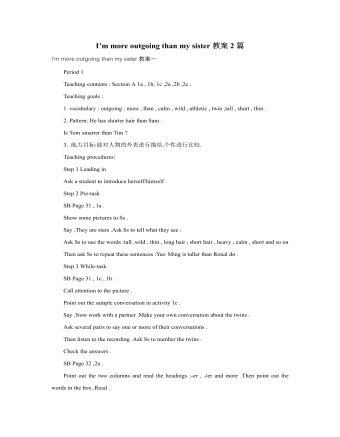
人教版新目标初中英语八年级上册I’m more outgoing than my sister教案2篇
1 交通工具的比较此活动为小组活动。学生通过讨论找出到达某一城市可乘坐的各种交通工具,并选择最佳出行方式。Teacher:We’re going to Shanghai. How many ways can we use to get there? Yes, there are four ways: by bus, by plane, by train, by ship. Please discuss how you are going to get there.操作建议:(1)学生以小组为单位展开活动,谈论本组所选择的交通工具。(2)各组选代表向全班汇报,阐述本组所选择的交通工具的利和弊。完成任务所需要的语言结构:We can go there by ship. It’s more comfortable and cheaper than any other transportation.We can go there by bus. It’s cheaper but it takes longer time.2 哪个城市更合适?此活动具有挑战性。假设中国要举行2014年世界杯足球赛,分别从历史,人文,天气等方面对各城市(北京,大连,上海,昆明)进行比较,选择最佳举办城市。T: Imagine China is holding the 2014 FIFA World Cup. Which city do you think is the best for the World Cup, Beijing, Dalian, Shanghai or Kunming? Let’s work in groups. If you choose Beijing, please join the Team Red. If you chose Dalian, please join the Team White. If you choose Shanghai, please join the Team Blue. If you choose Kunming, please join the Team Green. Please show us its advantages. Then let’s see which team will win.
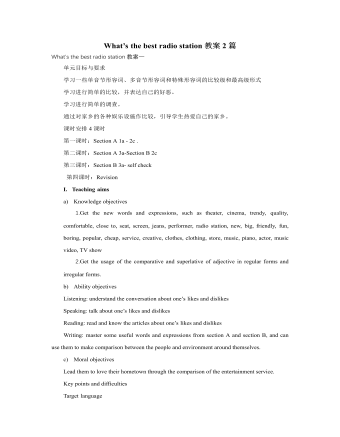
人教版新目标初中英语八年级上册What’s the best radio station教案2篇
教学重点和难点:运用所掌握的语言描述,比较不同地点的特点。在练习中学习掌握英语比较级和最高级的用法。课前准备分配小组,每组五至六人。通过上网或翻阅报刊杂志等方法,确定旅游线路,做出基本的旅游计划。教学设计:本节课流程图 学法指导:1.由于这是一堂新课,在教学中应注意面向全体,发挥学生的主体性,引导学生积极参与,激发学生的求知欲和学习积极性,指导学生积极思维,主动获取知识,养成良好的学习方法。逐步学会独立解决问题。总之要尽可能调动学生的非智力因素促进智力因素的发展。教法选择:1.电化教学法2.课堂讨论法3.任务型教学法采用这些方法的目的是为了充分调动学生的学习积极性,使学生变被动学习为主动学习。通过电脑形象的演示,加强印象,提高兴趣,突破难点,提高教学效率,进而增大教学的容量和信息量。充分体现教师为主导,学生为主体的教学原则。
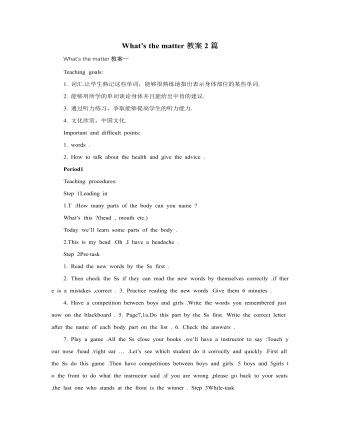
人教版新目标初中英语八年级上册What’s the matter教案2篇
She shouldn’t go to the party tonight.Step7. TaskT: You know, there are lots of problems in our life. If you are a doctor, please tell us how to solve the problem. I will divide you into 9 groups. Please work in groups. And then choose one of you to report your ideas.The following are the problems:I have a toothache.I am hungry. I have a sore throat.I am stressed out. I have a sore back.I am tired. I can’t sleep.I have a cold. I have a headache.Report: If you have a headache, you should go to bed early. You should see the doctor. You should eat some medicine. You shouldn’t wash your face with cold water.You shouldn’t sleep late.You shouldn’t swim.…..T encourages the students to give advice as much as possible.Homework:1. Chose one of the problems, and write down your advice2. Copy the new words这一步是用于热身的,同时也可以让他们复习一部分的表示人体部位的单词,扩充知识.学习语言的过程也是一个不断积累的过程,复习旧知识,增添新知识.通过小游戏,强化学生对Does she/he have…这个句子的运用能力.通过复习,自然的引到下面新知识的学习。充分利用表格,由句子到对话,再到文章,让学生循序渐进. 提高学生的综合语言运用能力,运用以前学过的知识来解决身边的问题.Period 5 (Section B 3a—3c, selfcheck)教学内容与分析:

人教版新目标初中英语九年级上册Teenagers should be allowed to choose their own clothes教案2篇
Step 1 Greeting Greet the class and check the homeworkStep 2 A duty report The S on duty gives a report on the rules in his home and lead in 3a “Sun Fei’s and Wu Yu’s rules” Step 3 ReadingSs read the conversation and write the two girls’ rules in the chart. Check the answers.Get Ss to read after the tape and then read aloud by themselves. Then, T explains the language points.Step 4 Pairwork 3bRole play. Use the information in chart to practice with the conversation in 3a covered. They can look at the sample conversation in the right box.Step 5 Task 2 “Who’s the best reporter?”Make a survey by asking any 5 students the questions in the chart in activity 4. Then give out a report about it. See who is the best reporter? And the best reporter will get a nice ball-pen.Step 6 Summary and homework:Write out the report in your exercise-books.Period ThreeStep 1 Greeting and a duty reportThe S gives a duty report talking about his experience of being late for school. Lead in the question “Do you ever get to school late? How often do you get to school late? Always, usually, sometimes, or never?Step 2 1a Get Ss to finish writing.Step 3 Pairwork 1b Get Ss to talk about their answers with their partners using the sample conversation in the box on the right.Step 4 Listening practice2a Lead-in: What will happen if you get to school late? What about Peter? Let’s listen to a conversation between Peter and his father. Get Ss to finish 2a (As usual, for the first time, Ss only listen.) Check the answers.

人教版新目标初中英语九年级上册How do you study for a test教案2篇
内容提示本单元主要内容是学会利用verb十by/with gerund表示方式方法来讨论学习英语的策略,认识自己在学习方面的长处和不足。初步了解现在完成时的结构和用法。现在完成时由助动词have/has+动词的过去分词构成,主要表示过去发生的某一动作对现在仍有影响或造成的后果,常与already,yet,just,ever,never等副词连用。教学目标一、学习目标(Language Goal) 1. Talk about how to study . 学会讨论各种学习方法和策略。2. Find out your suitable learning methods. 找出适合自己的学习方法。 二、语言结构(Language Structures) 1. Verb + by with gerund by+动名词短语 表示“通过…途径,方法” 2. How questions have引导的特殊疑问句 三、目标语言(Target Language) 1. How do you study for tests ? 你是怎样准备考试的?Well , I study by working with my classmates. 哦,我和同学们一起学习。2. Have you ever studied with a group ? 你曾经参加过学习小组吗?Yes , I have . I’ve learned a lot that way . 是的,参加过。通过这种方式我学了许多。

人教版新目标初中英语九年级上册Where would you like to visit教案2篇
The First PeriodⅠ.Teaching Aims and DemandsKnowledge Objects(1) Key Vocabularytiring, educational, fascinating, thrilling, peaceful, exotic, trek, jungle, take it easy, explore, historic, site(2) Target LanguageWhere would you like to go on vacation?I’d like to trek through the jungle, because I like exciting vacations.2. Ability Objects(1)Train students to talk about places they would like to visit with the target language.(2)Train students to describe vacations with different adjectives.(3)Train students' listening skill.3. Moral Object,It′s more interesting to go on vacating somewhere instead of staying at home.Ⅱ. Teaching Key Points1. Key Vocabularytiring, educational, fascinating, thrilling, peaceful, exotic, trek, jungle, take it easy, explore, historic, site2. Target LanguageTalk about different places with the target language.Ⅲ. Teaching Difficult Points1. Describe vacations with different adjectives.2. Talk about different places with the target language.Ⅳ. Teaching Methods1. Teaching by illumination2. Teaching by doing chain drills3. Teaching by pairworkⅤ. Teaching Aids1. A tape recorder2. Some pictures of different places with famous views
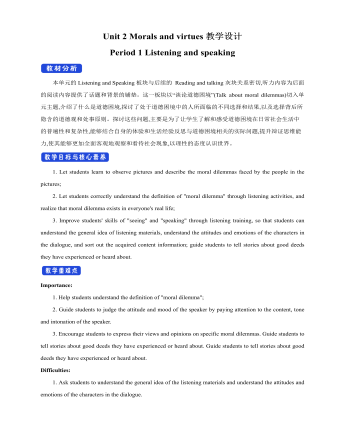
新人教版高中英语必修3Unit 2 Morals and virtues教学设计一
(2) students are divided into groups according to the requirements of activity 3. Each student shares a story of personal experience or hearing-witnessing kindness, and then selects the most touching story in the group and shares it with the whole class. Before the students share the story, the teacher can instruct them to use the words and sentence patterns in the box to express. For example, the words in the box can be classified:Time order: first of all, then, after that, later, finally logical relationship :so, however, although, butTeachers can also appropriately add some transitional language to enrich students' expression:Afterwards, afterwards, at last, in the end, eventuallySpatial order: next to, far from, on the left, in front ofOtherwise, nevertheless, as a result, therefore, furthermore, in addition, as well asSummary: in a word, in short, on the whole, to sum up, in briefStep 8 Homework1. Understand the definition of "moral dilemma" and establish a correct moral view;2. Accumulate vocabulary about attitudes and emotions in listening texts and use them to express your own views;3. Complete relevant exercises in the guide plan.1、通过本节内容学习,学生能否理解理解“道德困境”的定义;2、通过本节内容学习,学生能否通过说话人所表达的内容、说话的语气、语调等来判断其态度和情绪;3、通过本节内容学习,学生能否针对具体的道德困境发表自己的看法和见解,能否掌握听力理训练中的听力策略。
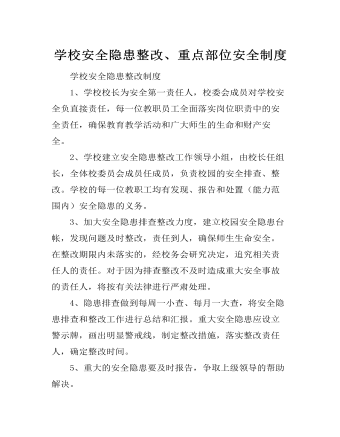
学校安全隐患整改、重点部位安全制度
2、学校建立安全隐患整改工作领导小组,由校长任组长,全体校委员会成员任成员,负责校园的安全排查、整改。学校的每一位教职工均有发现、报告和处置(能力范围内)安全隐患的义务。 3、加大安全隐患排查整改力度,建立校园安全隐患台帐,发现问题及时整改,责任到人,确保师生生命安全。在整改期限内未落实的,经校务会研究决定,追究相关责任人的责任。对于因为排查整改不及时造成重大安全事故的责任人,将按有关法律进行严肃处理。
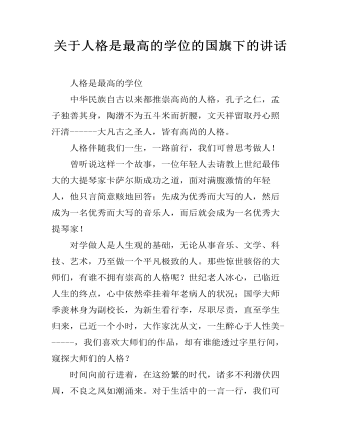
关于人格是最高的学位的国旗下的讲话
人格是最高的学位中华民族自古以来都推崇高尚的人格,孔子之仁,孟子独善其身,陶潜不为五斗米而折腰,文天祥留取丹心照汗清------大凡古之圣人,皆有高尚的人格。人格伴随我们一生,一路前行,我们可曾思考做人!曾听说这样一个故事,一位年轻人去请教上世纪最伟大的大提琴家卡萨尔斯成功之道,面对满腹激情的年轻人,他只言简意赅地回答:先成为优秀而大写的人,然后成为一名优秀而大写的音乐人,而后就会成为一名优秀大提琴家!对学做人是人生观的基础,无论从事音乐、文学、科技、艺术,乃至做一个平凡极致的人。那些惊世骇俗的大师们,有谁不拥有崇高的人格呢?世纪老人冰心,已临近人生的终点,心中依然牵挂着年老病人的状况;国学大师季羡林身为副校长,为新生看行李,尽职尽责,直至学生归来,已近一个小时,大作家沈从文,一生醉心于人性美------,我们喜欢大师们的作品,却有谁能透过字里行间,窥探大师们的人格?
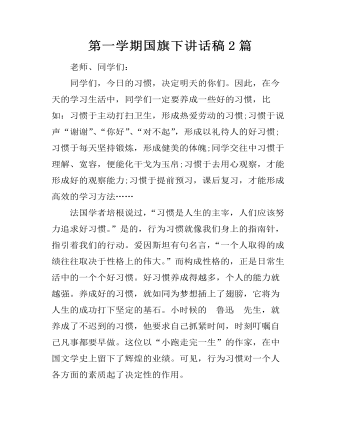
第一学期国旗下讲话稿2篇
老师、同学们:同学们,今日的习惯,决定明天的你们。因此,在今天的学习生活中,同学们一定要养成一些好的习惯,比如:习惯于主动打扫卫生,形成热爱劳动的习惯;习惯于说声“谢谢”、“你好”、“对不起”,形成以礼待人的好习惯;习惯于每天坚持锻炼,形成健美的体魄;同学交往中习惯于理解、宽容,便能化干戈为玉帛;习惯于去用心观察,才能形成好的观察能力;习惯于提前预习,课后复习,才能形成高效的学习方法……法国学者培根说过,“习惯是人生的主宰,人们应该努力追求好习惯。”是的,行为习惯就像我们身上的指南针,指引着我们的行动。爱因斯坦有句名言,“一个人取得的成绩往往取决于性格上的伟大。”而构成性格的,正是日常生活中的一个个好习惯。好习惯养成得越多,个人的能力就越强。养成好的习惯,就如同为梦想插上了翅膀,它将为人生的成功打下坚定的基石。小时候的 鲁迅 先生,就养成了不迟到的习惯,他要求自己抓紧时间,时刻叮嘱自己凡事都要早做。这位以“小跑走完一生”的作家,在中国文学史上留下了辉煌的业绩。可见,行为习惯对一个人各方面的素质起了决定性的作用。
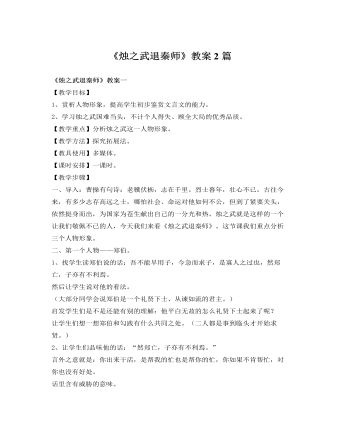
人教版高中语文《烛之武退秦师》教案2篇
【教学目标】1.学习本文精彩的人物语言——说理透辟,善于辞令,以及起伏跌宕,生动活泼的情节。2.掌握文章中出现的古汉语常识,注意多义词在不同语境中的不同意义和用法。3.了解烛之武说服秦伯的方法——善于利用矛盾,采取分化瓦解的方法,认识烛之武机智善辩的外交才能。【教学重点】1.烛之武人物形象的把握。2.波澜起伏,生动活泼的情节。【教学难点】通过学习本课,使学生对《左传》的语言特点有所了解。【教学过程】第一课时课前预习:(1)借助工具书,通读原文。(2)参考有关资料,对《左传》在先秦文学史中的地位及《左传》的语言特色有所了解。(3)初步了解故事情节,特别注意对烛之武这个中心人物的把握。(4)画出自己不理解的问题及难点。
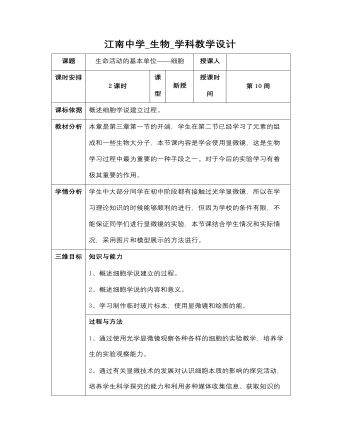
高中生物苏教版必修一《31生命活动及本单位-细胞》教案
本章是第三章第一节的开端,学生在第二节已经学习了元素的组成和一些生物大分子,本节课内容是学会使用显微镜,这是生物学习过程中最为重要的一种手段之一。对于今后的实验学习有着极其重要的作用。 学生中大部分同学在初中阶段都有接触过光学显微镜,所以在学习理论知识的时候能够顺利的进行,但因为学校的条件有限,不能保证同学们进行显微镜的实验,本节课结合学生情况和实际情况,采用图片和模型展示的方法进行。 知识与能力 1、概述细胞学说建立的过程。 2、概述细胞学说的内容和意义。 3、学习制作临时玻片标本,使用显微镜和绘图的能。
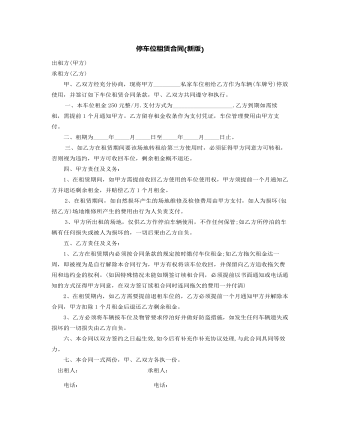
停车位租赁合同(新版)
甲、乙双方经充分协商,现将甲方_________私家车位租给乙方作为车辆(车牌号)停放使用,并签订如下车位租赁合同条款,甲、乙双方共同遵守和执行。一、本车位租金250元整/月.支付方式为____________________.乙方到期如需续租,需提前1个月通知甲方。乙方留存租金收条作为支付凭证,车位管理费用由甲方支付。二、租期为_____年_____月_____日至_____年_____月_____日止。三、如乙方在租赁期间要该场地转租给第三方使用时,必须征得甲方同意方可转租,否则视为违约,甲方可收回车位,剩余租金概不退还。四、甲方责任及义务:1、在租赁期间,如甲方需提前收回乙方使用的车位使用权,甲方须提前一个月通知乙方并退还剩余租金,并赔偿乙方1个月租金。2、在租赁期间,如自然损坏产生的场地维修及检修费用由甲方支付,如人为损坏(包括乙方)场地维修所产生的费用由行为人负责支付。
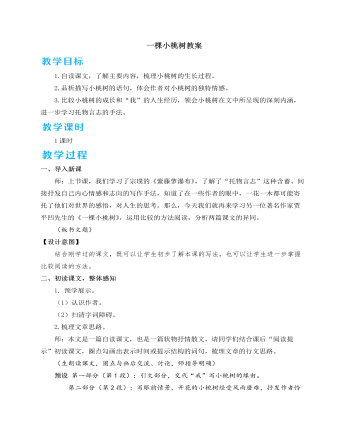
人教部编版七年级下册一棵小桃树教案
第三部分(第3—8段):写小桃树艰难曲折的生长过程。第四部分(第9—14段):回到眼前情景,生动地描写小桃树在风雨中的挣扎。3.理清小桃树的生长过程。师:作者写小桃树时,将眼前之景与回忆交叉叙写。请同学们按照时间顺序,理清小桃树的生长过程。预设 小桃树的生长过程:桃核被埋在院子角落里(“我”将它忘却)—萌芽(嫩绿)—长到二尺来高(样子极猥琐)—有院墙高了(被猪拱,讨人嫌,被遗忘,奶奶照顾)—开花(弱小,遭大雨,没有蜂蝶恋过,花零落,在雨中挣扎)—高高的一枝儿上保留着一个欲绽的花苞(在风雨中摇着愣是没掉下去,像风浪里航道上的指示灯)。师小结:小桃树的经历充满磨难:在几乎被“我”忘却的时候却破土而出;出生后瘦弱可怜,遭到大家的嘲笑,连奶奶也说它没出息;它被猪拱过,又险些被砍掉;它第一次开花就遭到风雨的摧残。但是,它一直顽强地生长,勇敢地与风雨搏斗,努力地绽放。本环节旨在运用圈点批注法理解作者对小桃树的情感。既能培养学生品析语言的能力,又能在把握小桃树意象的基础上准确体会作者的情感。
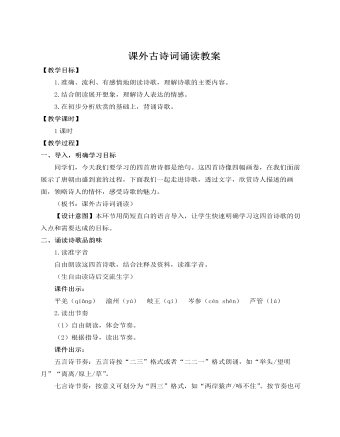
人教部编版七年级语文上册课外古诗词诵读(一)教案
(1)示例一(横向联想) 李白的送别诗:①“思君不见下渝州”,表达依依惜别的无限情思,可谓语短情长。②“仍怜故乡水,万里送行舟”,意思是“我”还是怜爱故乡的水,流过万里送“我”远行。这一句运用了拟人的修辞手法,将故乡水拟人化,借写故乡水有情,不远万里,依依不舍送“我”远别故乡,表达了诗人离开故乡时依依不舍、思念故乡的感情。③“孤帆远影碧空尽,唯见长江天际流。”这两句看起来似乎是写景,但在写景中包含着一个充满诗意的细节。李白一直把朋友送上船,船已经扬帆而去,而他还在江边目送远去的船帆。李白望着帆影,一直看到帆影逐渐模糊,消失在碧空的尽头,可见目送时间之长。帆影已经消失了,然而李白还在翘首凝望,这才注意到一江春水,在浩浩荡荡地流向远远的水天交接之处。“唯见长江天际流”,是眼前景象,可是谁又能说是单纯地写景呢?李白对朋友的一片深情,李白的向往,不正体现在这富有诗意的神驰目注之中吗?诗人的心潮起伏,不正像那浩浩东去的一江春水吗?



